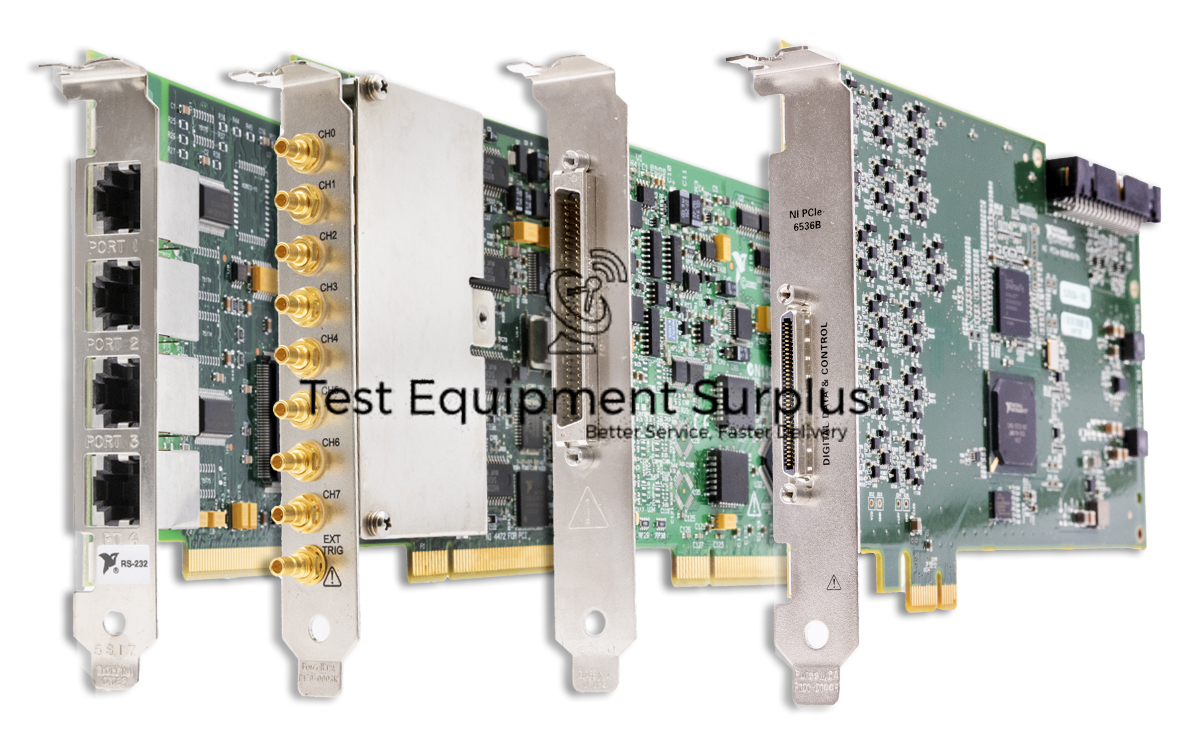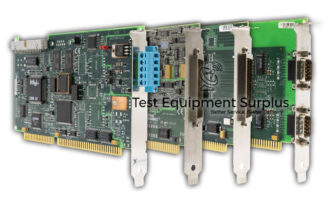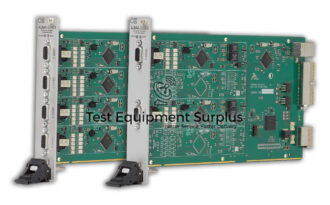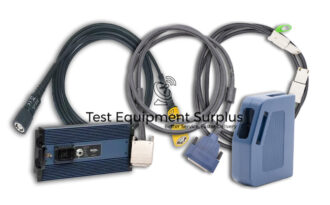Description
The National Instruments PCIe-1473R Image Acquisition Device, with part numbers 781585-01 and 782849-01, is a sophisticated Camera Link Frame Grabber Device equipped with a user-programmable Virtex-5 LX50 FPGA, designed to support complex image processing tasks. It boasts powerful capabilities, including 80-bit, 10-tap image acquisition, making it compatible with the Camera Link 1.2 standard and suitable for a variety of applications.
This device operates with a clock frequency range from 20 MHz to 85 MHz and provides a bandwidth of up to 850 MB/s over two Camera Link cables, ensuring fast and efficient data transfer. The PCIe-1473R is versatile, functioning with or without Power over Camera Link (PoCL) cables, and is used in critical applications such as medical imaging, food sorting, semiconductor wafer alignment, and flat panel presentation review.
When compared to other products, it stands out as a better alternative to the NI-1483 and serves as an excellent replacement for the FlexRIO platform. The inclusion of NI-IMAQ and NI-RIO driver software further enhances its compatibility with cameras of base, full, medium, and extended full configurations. Additionally, an optional Digital I/O Expansion Card can be added to the system for additional triggering capabilities, making the National Instruments PCIe-1473R a versatile and robust solution for advanced image acquisition needs.
| Feature | Description |
|---|---|
| Product Name | National Instruments PCIe-1473R Image Acquisition Device |
| Part Numbers | 781585-01, 782849-01 |
| Type | Camera Link Frame Grabber Device |
| FPGA | User-programmable Virtex-5 LX50 |
| Image Acquisition | Supports 80-bit, 10-tap image acquisition |
| Camera Link Standard | Compatible with Camera Link 1.2 standard cameras |
| Clock Frequency Range | 20 MHz to 85 MHz |
| Bandwidth | Up to 850 MB/s over Two Camera Link cables |
| Power over Camera Link (PoCL) | Workable with or without PoCL cables |
| Applications | Medical imaging, food sorting, semiconductor wafer alignment, flat panel presentation review, etc. |
| Comparison | Better alternative to NI-1483 and replacement for FlexRIO platform |
| Driver Software | NI-IMAQ and NI-RIO |
| Camera Link Configuration Support | Base, full, medium, and extended full configuration |
| Optional Accessories | Digital I/O Expansion Card for additional triggering |
Question 1: How does the National Instruments PCIe-1473R Image Acquisition Device support advanced image processing tasks, and what are its main features and capabilities that make it suitable for applications such as medical imaging and semiconductor wafer alignment?
Answer 1: The National Instruments PCIe-1473R Image Acquisition Device is distinguished by its user-programmable Virtex-5 LX50 FPGA, which is specifically designed to handle complex image processing tasks, coupled with powerful 80-bit, 10-tap image acquisition capabilities, making it highly suitable for a wide range of applications that require advanced image processing.
Question 2: What are the benefits and applications of the National Instruments PCIe-1473R Image Acquisition Device when compared to the NI-1483, and how does its FPGA and bandwidth capabilities enhance image processing tasks in industries like medical imaging and semiconductor manufacturing?
Answer 2: The National Instruments PCIe-1473R Image Acquisition Device offers significant benefits over the NI-1483, including a user-programmable Virtex-5 LX50 FPGA for advanced image processing, an 80-bit, 10-tap acquisition capability in line with the Camera Link 1.2 standard, and high-speed data transfer with bandwidths up to 850 MB/s. These features make it highly suitable for industries requiring precise and rapid image analysis, such as medical imaging for detailed diagnostics,
Question 3: What distinguishes the National Instruments PCIe-1473R Image Acquisition Device’s FPGA from others in terms of image processing capabilities?
Answer 3: The National Instruments PCIe-1473R Image Acquisition Device is a high-performance Camera Link Frame Grabber equipped with a user-programmable Virtex-5 LX50 FPGA and supports 80-bit, 10-tap image acquisition, making it compatible with the Camera Link 1.2 standard. It operates at a clock frequency range of 20 MHz to 85 MHz and offers a bandwidth of up to 850 MB/s, suitable for applications like medical imaging, food sorting, semiconductor wafer
Question 4: What features make the National Instruments PCIe-1473R Image Acquisition Device stand out for advanced image acquisition tasks, and how does it improve upon previous solutions like the NI-1483 and the FlexRIO platform?
Answer 4: The National Instruments PCIe-1473R Image Acquisition Device stands out for advanced image acquisition tasks with its user-programmable Virtex-5 LX50 FPGA, 80-bit, 10-tap image acquisition capability, compatibility with Camera Link 1.2 standard, and bandwidth of up to 850 MB/s, along with versatile clock frequency range from 20 MHz to 85 MHz. It improves upon previous solutions like the NI-1483 by offering a better alternative with enhanced speed and flexibility
Question 5: What are the key features and applications of the National Instruments PCIe-1473R Image Acquisition Device, and how does it compare to similar products such as the NI-1483 and the FlexRIO platform?
Answer 5: The National Instruments PCIe-1473R Image Acquisition Device supports advanced image processing tasks with its user-programmable Virtex-5 LX50 FPGA and 80-bit, 10-tap image acquisition, making it compatible with the Camera Link 1.2 standard. Its main features include a clock frequency range from 20 MHz to 85 MHz, bandwidth up to 850 MB/s, versatility with Power over Camera Link (PoCL) cables, and additional triggering capabilities through an optional Digital I




